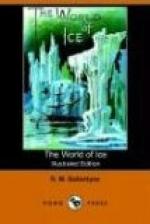For the first time since the chase began a feeling, of intense pity touched Fred’s heart, and he would have rejoiced at that moment had the mother risen up and made her escape with her cub. He steeled his heart, however, by reflecting that fresh provisions were much wanted on board the Dolphin; still, neither he nor his shipmates could bring themselves to shoot the gallant little animal, and it is possible that they might have made up their minds to allow it to escape after all, had not Meetuck quietly ended their difficulty by putting a ball through its heart.
“Ah! then, Meetuck,” said O’Riley, shaking his head as they examined their prize, “ye’re a hardhearted spalpeen, ye are, to kill a poor little baby like that in cowld blood. Well, well, it’s yer natur’, an’ yer trade, so I s’pose it’s all right.”
The weight of this bear, which was not of the largest size, was afterwards found to be above five hundred pounds, and her length was eight feet nine inches. The cub weighed upwards of a hundred pounds, and was larger than a Newfoundland dog.
The operation of cutting out the entrails, preparatory to packing on the sledge, was now commenced by Meetuck, whose practised hand applied the knife with the skill, though not with the delicacy, of a surgeon.
“She has been a hungry bear, it seems,” remarked Fred, as he watched the progress of the work, “if we may judge from the emptiness of her stomach.”
“Och! but she’s had a choice morsel, if it was a small wan,” exclaimed O’Riley in surprise, as he picked up a plug of tobacco. On further examination being made, it was found that this bear had dined on raisins, tobacco, pork, and adhesive plaster! Such an extraordinary mixture of articles, of course, led the party to conclude that either she had helped herself to the stores of the Dolphin placed on Store Island, or that she had fallen in with those of some other vessel. This subject afforded food for thought and conversation during the next hour or two, as they drove towards the ship along the ice-belt of the shore.
The ice-belt referred to is a zone of ice which extends along the shore from the unknown regions of the North. To the south it breaks up in summer and disappears altogether, but in the latitude which our travellers had now reached, it was a permanent feature of the scenery all the year round, following the curvatures and indentations of bays and rivers, and increasing in winter or diminishing in summer, but never melting entirely away. The surface of this ice-belt was covered with immense masses of rock many tons in weight, which had fallen from the cliffs above. Pointing to one of these as they drove along, West remarked to Fred,—
“There is a mystery explained, sir. I have often wondered how huge, solitary stones, that no machinery of man’s making could lift, have come to be placed on sandy shores where there were no other rocks of any kind within many miles of them. The ice must have done it, I see.”




